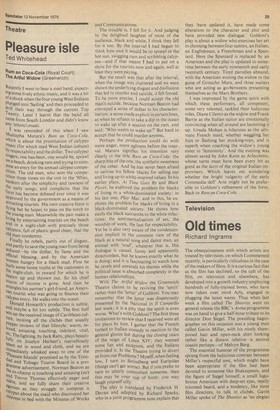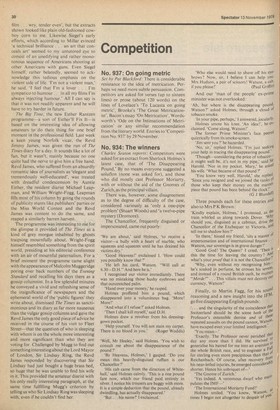Television
Old times
Richard Ingrams
The obsequiousness with which artists are treated by television, on which I commented recently, is particularly ridiculous in the case of the makers of films. It is a curious fact that as the film has declined, so the cult of the film, on television and elsewhere, has developed into a growth industry employing hundreds of fully-trained bores, who have now taken over most Arts, engaged in plugging the latest wares. Thus when last week a film called The Shootist went on general release the BBC's Arena programme was on hand to give a half-hour tribute to its director Don Siegel. The presiding hagiographer on this occasion was a young man called Gavin Millar, with his nicely shampooed hair and open-neck shirt looking rather like a distant relative—a second cousin perhaps—of Melvyn Barg.
The essential humour of the programme sprang from the ludicrous contrast between Millar's respectful awe, which might have been appropriate if the film had been devoted to someone like Shakespeare, and the figure of Siegel himself, a small lugubrious American with deep-set eyes, neatly trimmed beard, and a tendency, like most film directors, to talk in clichés. Gavin Millar spoke of The Shootist as 'an elegiac film . . . wry, tender even', but the extracts shown looked like plain old-fashioned cowboy corn to me. Likewise Siegel's early efforts, which according to Millar evinced 'a technical brilliance . . . an art that conceals art' seemed to my untutored eye to consist of an unedifying and rather monotonous sequence of Americans shooting at other Americans with guns. Even Siegel himself, rather belatedly, seemed to acknowledge this tedious emphasis on the violent side of life. 'I'm not a violent man,'
he said, feel that I'm a lover . . I'm sympatico to humour .. in all my films I'm always injecting humour.' All I can say is that it was not readily apparent and he will have to try harder in future.
The Big Time, the new Esther Rantzen programme--a sort of Esther'll Fix It—is based on the interesting idea of allowing amateurs to do their, thing for one brief moment in the professional field. Last week a keen young Norfolk vicar, the Revd Jimmy James, was given the run of The Times diary for a day. It sounds like a lot of fun, but it wasn't, mainly because no one quite had the nerve to give him a free hand. Revd James, who suffered from an absurdly romantic idea of journalists as 'elegant and tremendously well-educated', was treated with dreadful condescension by Auntie Esther, the resident diarist Michael Leapman, and William Wright-Fogg. Leapman fills most of his column by going the rounds of publicity stunts like publishers' parties or the Miss World Contest and the Revd James was content to do the same, and reaped a similarly barren harvest.
The programme was interesting to nie for the glimpse it provided of The Times as a kind of grey morgue inhabited by ghosts traipsing mournfully about. Wright-Fogg himself resembled something from the spirit world, presiding at his editorial conference with an air of mournful paternalism. For a brief moment the programme came alight with the appearance of Malcolm Muggeridge poring over back numbers of the Evening Standard and recalling his days there as a gossip columnist. In a few splendid minutes he conveyed a vivid and refreshing sense of the insignificance of newspapers and the ephemeral world of the 'public figures' they write about, dismissed The Times as sanctimonious and its diary as far more nauseous than the vulgar gossip columns and gave the Revd James the only good piece of advice he received in the course of his visit to Fleet Street—that the question of who is sleeping with whom is on the whole more interesting and more significant than who they are voting for. Challenged by Mugg to find out something interesting about the Lord Mayor of London, Sir Lindsay Ring, the Revd James responded by discovering that Sir Lindsay had just bought a huge brass bed, so huge that he was unable to find his wife in it. This provided the amateur diarist with his only really interesting paragraph, at the same time fulfilling Mugg's criterion by telling us who Sir Lindsay Ring was sleeping with, even if he couldn't find her.



































 Previous page
Previous page